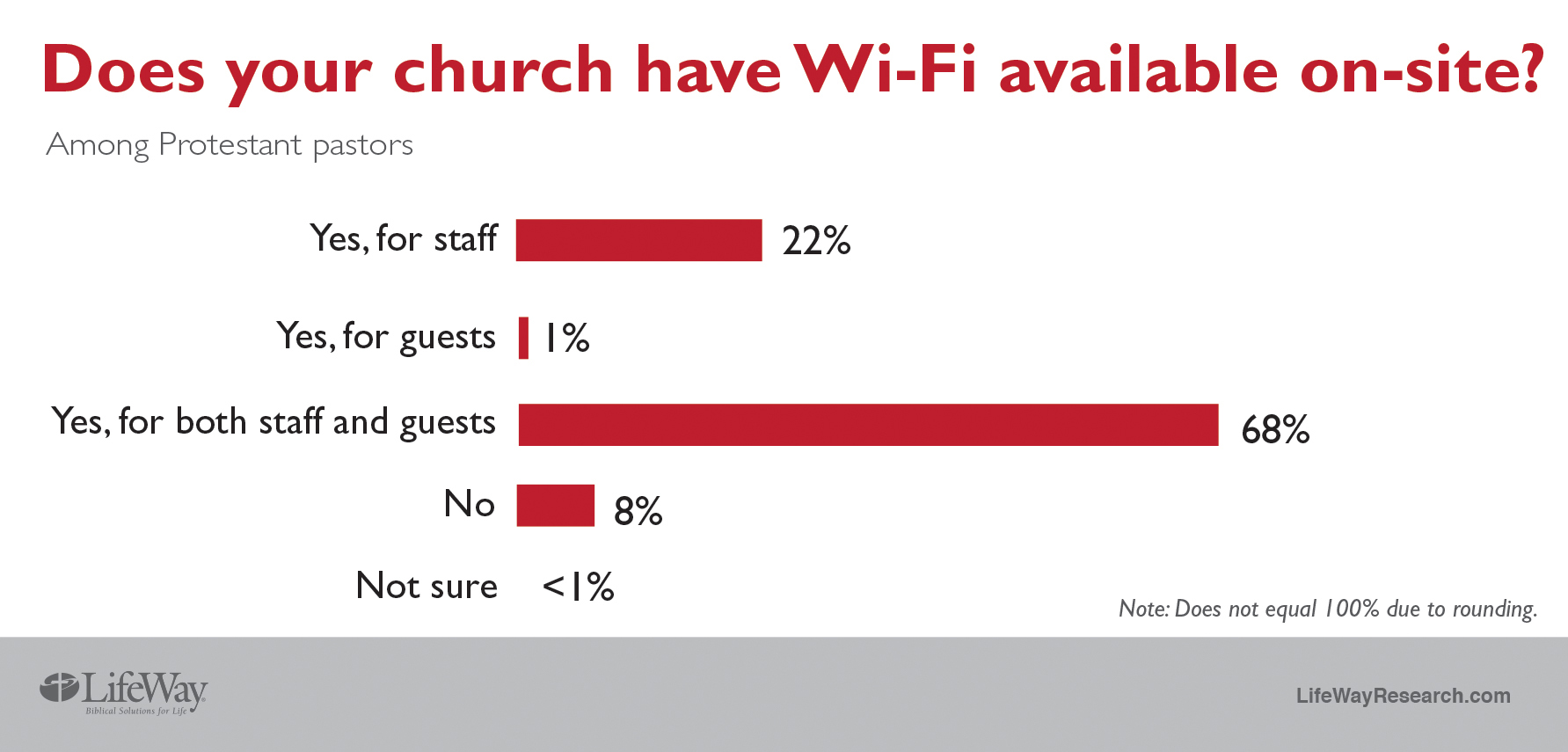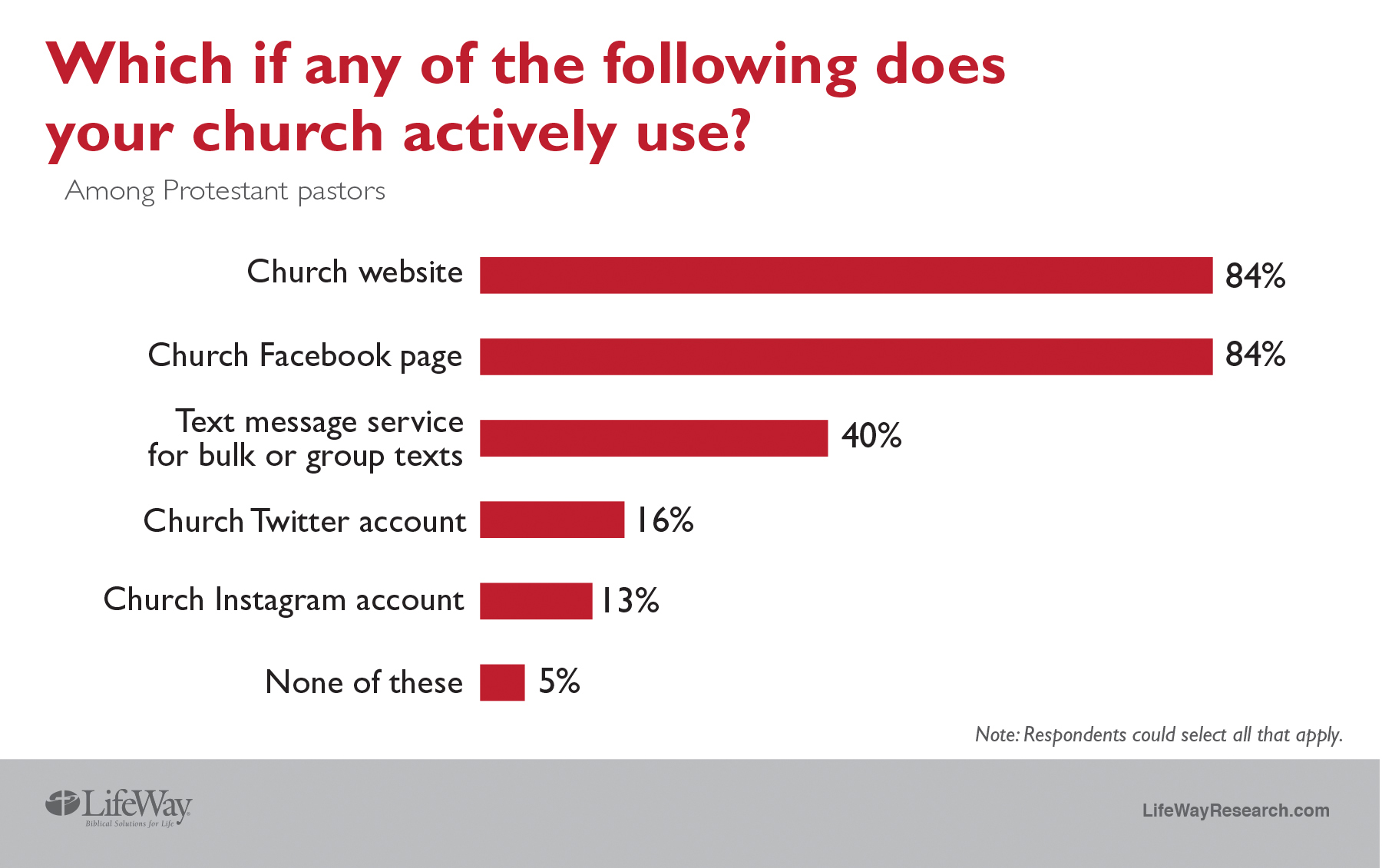
NASHVILLE (BP) — Going to church for some can be a bit like hanging out at Starbucks. The coffee’s hot, the people are friendly, and the Wi-Fi is almost always free.
 Seven in 10 Protestant churches (68 percent) provide Wi-Fi for both guests and staff, according to a survey of Protestant senior pastors that LifeWay Research released today (Jan. 9).
Seven in 10 Protestant churches (68 percent) provide Wi-Fi for both guests and staff, according to a survey of Protestant senior pastors that LifeWay Research released today (Jan. 9).
Most also have a website (84 percent) and a Facebook page (84 percent).
But few have ventured on Twitter (16 percent).
Once wary of technology, Protestant churches now seem all in, said Scott McConnell, executive director of LifeWay Research. It’s another way to connect with guests and worshipers alike.
“Not long ago churches’ use of technology was often limited to a website that functioned like the Yellow Pages or a bulletin board,” McConnell said of the study conducted Aug. 30 to Sept. 18, 2017. “Now they see technology as a way to interact with people. Wi-Fi is just one more way to do that.”
Churches and Facebook
 A website and Facebook page are the most common online tools used by Protestant churches. Both are used for similar goals — to interact with the congregation and to reach outsiders.
A website and Facebook page are the most common online tools used by Protestant churches. Both are used for similar goals — to interact with the congregation and to reach outsiders.
Among those with a website, 99 percent use their site to provide information to visitors, while 94 percent use it to inform the congregation. Seventy-one percent use their site to recruit volunteers or let people know about their ministries. Half (47 percent) let people register for events, while about a third (36 percent) let people give online. About a quarter (23 percent) have a secure, online church directory.
When it comes to social media, churches are most likely to use Facebook. Few use either Instagram (13 percent) or Twitter (16 percent). Forty percent have a program to send out bulk texts to church members.
The use of Facebook by churches has emerged rapidly. A 2010 LifeWay Research study found that less than half (47 percent) had Facebook pages.
Among those who use social media in 2017, 97 percent use it to inform people about coming events. Eighty-seven percent use it to interact with the congregation, while 86 percent use social media to interact with outsiders. Eighty-four percent use social media to capture memories of church activities, while 68 percent use social media to help church members interact.
Even most small churches — those with fewer than 50 attenders — are likely to have a Facebook page (70 percent). Larger churches — those with 250 or more attenders — are more likely to also use Twitter (39 percent) and Instagram (29 percent).
Small churches wary of online giving
 Most churches aren’t afraid of new technology, according to LifeWay Research. Two percent say they avoid new technology, while 14 percent say they are slow to adopt new technology. Twenty-three percent proactively look for new technology to use.
Most churches aren’t afraid of new technology, according to LifeWay Research. Two percent say they avoid new technology, while 14 percent say they are slow to adopt new technology. Twenty-three percent proactively look for new technology to use.
More than half (61 percent) are open to new technology but don’t go looking for it.
That’s especially true when it comes to online giving. Despite the popularity of electronic bill-paying, only about 30 percent of all churches in the study allow online giving through their website.
That’s up from 14 percent in 2010, according to LifeWay Research. Still, McConnell expected that figure to be higher, given that Americans pay more than half (56 percent) of their bills online, according to a 2017 report from ACI Online.
Pentecostals (59 percent) are most likely to say their church website offers online giving. Baptists (32 percent), Lutherans (33 percent), Methodists (38 percent), and Presbyterian/Reformed churches (26 percent) are less likely.
Bigger churches — those with 250 or more attenders — seem to love online giving, as 74 percent of them offer it on their websites. By contrast, 4 in 10 (39 percent) churches with 100 to 249 attenders offer online giving. And only a quarter (23 percent) of smaller churches — those with 100 attenders or fewer — offer online giving.
“Technology is great, but smaller churches still like to pass the plate,” McConnell said.
Methodology
The phone survey of 1,000 Protestant pastors was conducted Aug. 30 to Sept. 18, 2017. The calling list was a stratified random sample, drawn from a list of all Protestant churches. Quotas were used for church size. Each interview was conducted with the senior pastor, minister or priest of the church called. Responses were weighted by region to more accurately reflect the population. The completed sample is 1,000 surveys. The sample provides 95 percent confidence that the sampling error does not exceed plus or minus 3.2 percent. Margins of error are higher in subgroups.
LifeWay Research is a Nashville-based, evangelical research firm that specializes in surveys about faith in culture and matters that affect churches.















